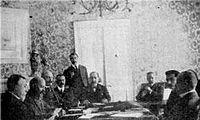By KONSTANTIN TESTORIDES
Associated Press
SKOPJE, Macedonia (AP) - Macedonia's short history
of independence has been a troubled one - and its political turmoil
appears to be getting worse.
The government in this Balkan nation of about 2
million people is reeling from a massive wiretap scandal and a gunbattle
between police and ethnic Albanian gunmen that left 18 dead in a border
town a week ago. In a region with a long and bloody history of ethnic
conflicts and political instability, the developments have caused
consternation both domestically and abroad.
Months of accusations between rival politicians
locked in a power struggle have plunged the country into one of its
deepest political crises since Macedonia gained independence from the
former Yugoslavia in 1991.
Potential trouble looms again on Sunday, when the
opposition plans an anti-government rally billed as the largest
Macedonia has ever seen in the capital, Skopje. The protests are
supposed to continue for days, and a rival pro-government protest has
been called for Monday.
Sunday's opposition rally "will be a historic day
of reckoning for the current government of Macedonia," said Nikola
Dimitrov, a former national security adviser. "The increasingly
authoritarian regime of (Prime Minister Nikola) Gruevski will face a
crowd of citizens craving freedom, democracy, rule of law and
accountability."
Dimitrov, now a fellow at The Hague Institute for
Global Justice, predicted that "in an all-or-nothing situation, (the
government) will be ready to pay a very high price to survive."
At the heart of the crisis is a massive cache of
wiretapped conversations that the head of the opposition Social
Democrats, Zoran Zaev, has been releasing since January. Zaev claims
that Gruevski, in power for nearly a decade, was behind the mass
wiretapping of more than 20,000 Macedonians, including ministers,
politicians, police, journalists, judges, foreign ambassadors and
religious leaders.
Those conversations, which Zaev said were leaked to
him by "patriots" in the domestic intelligence service, purport to
reveal corruption at the highest levels of government, including the
mismanagement of funds, spurious criminal prosecutions of opponents and
even attempted cover-ups of killings. He has demanded that Gruevski
resign and new elections be held.
Opposition parties have been boycotting parliament
for nearly a year since accusing the governing coalition of fraud in the
April 2014 election.
Gruevski, who has won successive elections since
2006, angrily rejects the accusations. He accuses Zaev of participating
in a coup plot backed by unnamed foreign spy agencies seeking to
overthrow his conservative government.
Some Macedonians are worried.
"I am afraid that Macedonia could enter into civic
conflict with unpredictable consequences," said Julijana Petrovska, a
64-year-old retired economist. "People are so stubborn ... and divided
that things could get out of control easily."
But others blame the opposition for creating instability.
Zaev "started to publish recordings he got from
foreign spies and now he wants to seize power illegally, without
elections," said Jovan, a 23-year-old law student who would only give
his first name for fear of reprisals. "He is the one the most
responsible for this crisis."
The government has come under growing criticism
from the West, including from the 28-nation European Union, which
Macedonia hopes to join one day. EU officials have expressed concern
over the harassment of the press and apparent meddling in court cases in
Macedonia, among other issues.
The ambassadors of Britain, Germany, France, Italy
and the EU met Gruevski recently and issued a strongly worded statement
saying the government "has not made progress toward accounting for many
allegations of government wrongdoing" arising from the wiretap
disclosures.
"Continued inaction" will undermine the country's efforts to join the EU and NATO, they said.
The government says it's doing what it can. On
Thursday, Gruevski attended a Western ambassador-brokered meeting with
Zaev and the heads of two ethnic Albanian parties in the first direct
talks since the political crisis began in January. The four agreed to
meet again Monday and to ensure that future demonstrations are peaceful.
The interior and transport ministers, Gordana
Jankuloska and Mile Janakieski, and top intelligence chief Saso Mijalkov
- a relative of Gruevski - resigned a few days ago, saying they did so
to calm the situation. The three were the voices most heard on the
recordings.
Meanwhile, the ghost of Macedonia's brief 2001
armed conflict between government forces and the country's ethnic
Albanian minority, which fought for greater rights, hovers over the
country once more.
Clashes in the border town of Kumanovo earlier this
month killed 10 gunmen and eight police and wounded 37 police. Some
gunmen wore insignia used by ethnic Albanian rebels during their
insurgencies in Serbia and Macedonia in the late 1990s and early 2000s.
It is still unclear how the fighting in Kumanovo
began. The government said police forces mounted an operation after
tracking an armed group of about 50 men to a house there. Last month
Macedonian police said a smaller group attacked a border watchtower,
briefly taking two Macedonian border guards hostage before releasing
them unharmed.
Political analyst Saso Ordanovski said he thinks the gunmen were mercenaries.
"Somebody paid them to draw attention away from
what is going on at the moment in the country," Ordanovski said.
Gruevski, he argued, "is the one who benefits the most from the incident
... He is facing the growing revolt and demands from abroad that he
must do something."
Ali Ahmeti, who heads the ethnic Albanian junior
government coalition partner, said he had been in contact with the
gunmen but it was unclear what their motives were. He said they had
asked for his help in brokering their surrender. Saying that most ethnic
Albanians do not back an insurgency, Ahmet called for an international
investigation into the clashes.
Dimitrov, the former security adviser, said there was only one way to resolve the crisis.
"Regardless of how much time it will take, and how
difficult it will be, there can only be one sustainable outcome: an
interim government to clean up the system, introduce robust checks and
balances, promote justice, and prepare for free and fair elections," he
said.
Copyright 2015 The
Associated Press. All rights reserved. This material may not be
published, broadcast, rewritten or redistributed.



.jpg)
































